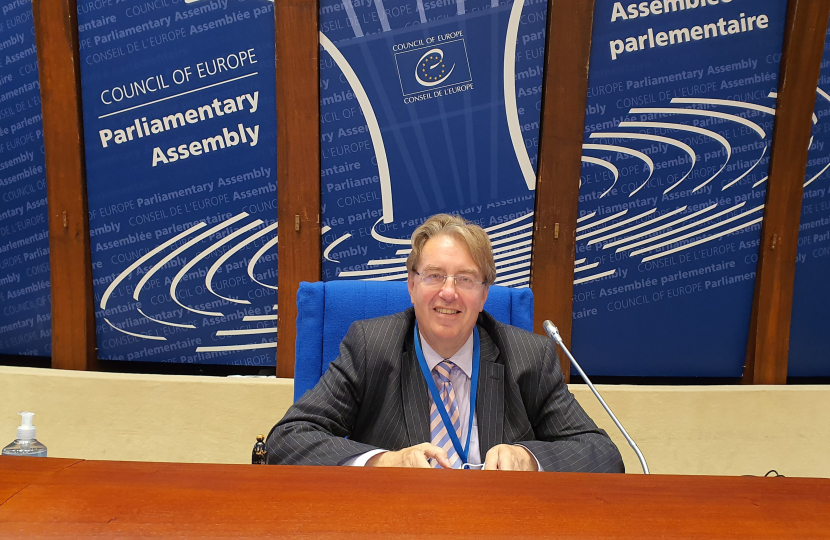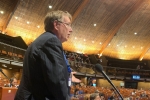
The Parliamentary Assembly of the Council of Europe has four Plenary Session each year. Below is John's Delegation Leader report for the April session.
Leader's Introduction. This part-Session of the Council of Europe Parliamentary Assembly was, like the previous one, dominated by the war of aggression by Russia against Ukraine. There were two papers presented. The first of these was entitled Consequences of the Russian Federation’s continued aggression against Ukraine: role and response of the Council of Europe and the second was entitled Russian Federation’s aggression against Ukraine: ensuring accountability for serious violations of international humanitarian law. I will deal with these in the body of this report. The concerns here came from the Germanic far left and far right where both wings were unhappy to be seen to supply weapons to Ukraine.
In addition another contentious issue was in relation to Turkey. The Courts in Turkey had issued Osman Kavala, a Turkish businessman, philanthropist and activist with an aggravated life sentence. This did not respect the specific judgments of the European Court of Human Rights. I successfully argued that it was politically impossible for the Monitoring Committee of the Parliamentary Assembly to have its planned “business as usual” meeting in Ankara in these circumstances and the meeting was postponed. I and my co-Rapporteur for Turkey were instructed to go to Turkey to engage on this subject.
There was also criticism of the Secretary General who answered questions only from the spokespeople from political parties and excluded the bulk of the Parliamentary Assembly’s membership. This did not stop Gagan Mohindra from asking a pointed question about the value of an organisation funded by the Council of Europe entitled the North-South Centre.
The UK Delegation also met a delegation from Kosovo, which is not yet a member of the Council of Europe. We agreed to work with the Kosovan delegation to help them frame their application for membership of the Council of Europe despite the objections of a number of other countries including Serbia, Spain and Greece.
Best wishes, John Howell OBE MP, Leader of the UK Delegation
FULL REPORT APRIL 2022 PLENARY SESSION
Progress report of the Bureau. Ian Liddell-Grainger presented the Bureau’s progress report. He concentrated on the question of progress between World War II and today’s aggression against Ukraine. He said we were in the middle of an armed conflict – not aggression. The key question was whether we should send weapons to Ukraine. The reality on the ground was that people are being murdered. Lord Foulkes raised two points - first, what happened to the reports we produced and secondly, how do we improve the image and profile of the Council of Europe. The latter is something on which I have had detailed discussions with the Deputy Secretary General.
For an assessment of the means and provisions to combat children's exposure to pornographic content. In this debate, for which I was in the Chair, the speakers included the following members of the UK Delegation – Lord Russell, Tonia Antoniazzi, Lord Griffiths and Cherylin Mackrory. The debate looked at how the Council of Europe could strengthen the protection of minors from exposure to pornography. The report allowed the Council to look at the different means and devices that exist to fight against the exposure of children to pornographic contents. It was reported that the pornographic industry itself was aware of the problem and was ready to work with the Council.
Beyond the Lisbon Treaty: strengthening the strategic partnership between the Council of Europe and the European Union. In this debate the speakers from the UK Delegation included Sir Christopher Chope, John Howell and Lord Foulkes. We took somewhat different views of the Lisbon Treaty but, in my speech, I made the point that I was speaking on behalf of the Council of Europe and not being anti the EU. To this extent we needed to make sure that any partnership between the two bodies understood clearly what was in it for the Council of Europe and that it should not compromise the Council of Europe’s independence. Given for example that all member countries of the EU were also signatories to the Convention on Human Rights I could see no reason for making special arrangements for the EU to join, although one system of human rights across Europe was preferable
Annual activity report 2021 by the Council of Europe Commissioner for Human Rights. In this debate I alone spoke from the UK Delegation to ask the Commissioner about the situation in Turkey and the long sentence given to Osman Kavala. The Commissioner said that we needed to ensure that we maintained dialogue with Turkey to try to resolve the situation, and referred to the recent visit to Turkey by me and my co-Rapporteur to discuss the issue.
Secretary General of the Council of Europe. The Secretary General answered questions on Turkey, Ukraine, the Council of Europe’s office in Kyiv, the financial situation of the Council, and espionage activities.
Deinstitutionalisation of persons with disabilities. This report reinforced the importance of persons with disabilities having the same human rights as all of us. Persons with disabilities had the right to live independently and receive appropriate community-based services. The report made the point that society must accommodate human diversity and enable persons with disabilities to be an active part of it in order to achieve full inclusion and participation of persons with disabilities in the community. Ruth Jones spoke from the UK Delegation and emphasised quality of life issues.
Tackling discrimination based on social origin. The report looked at four issues: (1) How do our circumstances at birth, or even pre-birth, determine outcomes of our lives? (2) To what extent does being born in a certain neighbourhood or belonging to a certain social class impact our chances and life outcomes? (3) Is it possible for the millions of underprivileged people to break the class ceiling and become upwardly mobile in this prevailing social structure that we have? (4) How can we ensure legal protection against discrimination based on the social origin of millions of people? From the UK Delegation Tommy Sheppard and Lord Griffiths spoke.
Consequences of the Russian Federation's continued aggression against Ukraine: role and response of the Council of Europe. This debate was oversubscribed massively so important was the subject. At its heart was a debate as to whether the Council of Europe should stick to the compromise wording worked out at the last session or whether it should go further, listen to the Ukrainians and be specific about encouraging the need to provide military assistance. Amendments to this effect, which were led by Lord Russell, were eventually defeated but it was admitted that the report was implicit that military assistance should be provided and explicit about protecting Ukrainian airspace. I do not want to damn the report with faint praise because it did cover a lot of important issues such as the importance of having a strong role for the International Court and the situation of refugees, as well as the recognition that Russia was committing war crimes. But it was disappointing that so many seemed intimidated by Mr Putin’s threats of nuclear war. The report made much of trying to retain balance. But there is no balance between Russia and Ukraine and Ukraine poses no threat to Russia at all. In this debate the following members of the UK Delegation spoke: John Howell, Geraint Davies, Jerome Mayhew, Jane Stevenson and Lord Russell. Sir Edward Leigh’s speech is published in the written record.
Address by Mr Sergio Mattarella, President of the Italian Republic. We had the opportunity to hear an Address from the President of Italy and to ask questions. I asked what the Italian government was doing to enforce sanctions given that some 13 major Italian companies were still trading with Russia. The President also gave an historical perspective of the role of the Council of Europe in pursuing peace.
How to put confiscated criminal assets to good use? The question this report sought to answer was how to ensure that proceeds confiscated from criminal activity and corruption are used to repair the damage done by crime and corruption? The answer produced was to hit the criminals and the corrupt where it hurts them the most: in their wallets. But it was also, and above all, to make the rule of law triumph in a way that is visible to society.
Fighting and preventing excessive and unjustified use of force by law enforcement officers. Lord Griffiths from the UK Delegation spoke in this debate. The report looked at how a well-known incident of excessive use of force in the United States of America had triggered the idea of proposing a binding international instrument: the death of George Floyd. It also found many other incidents of excessive force by law enforcement agents including in European countries. In some countries, excessive force became a systemic problem, while law enforcement agents themselves contributed to the escalation of violence.
Communication from the Committee of Ministers. Italian Minister of Foreign Affairs Mr Luigi de Maio, on behalf of the Committee of Ministers, answered a range of questions ranging from the arrest of Vladimir Kara-Murza in Russia; the implementation of judgments of the European Court of Human Rights; financial issues faced by the Council of Europe; the Lanzarote Convention; spyware; and the situation in Nagorno-Karabakh.
The Russian Federation’s aggression against Ukraine: ensuring accountability for serious violations of international humanitarian law and other international crimes. A completely different debate in terms of approach than the previous one on Russia. This debate looked at the extent of humanitarian problems as a result of the war in Ukraine and the need to bring justice to the situation. This report focused on the need to ensure accountability of the perpetrators of the violation of international humanitarian law and other international crimes including where appropriate President Putin. The motion passed with very few amendments and by a vast majority. I chaired part of this debate and the UK Delegation speakers consisted of Lord Foulkes and Sir Tony Lloyd.
Safeguarding and promoting genuine democracy in Europe. As the Rapporteur said, this report was born out of the fact that democracy is in clear decline in the world and in Europe. It is facing a double crisis: not only is it threatened from "within", i.e. by governments or democratically elected leaders, who are progressively emptying it of its substance, but it is also suffering from a decline in citizens' confidence in its institutions and in its ability to tackle the major challenges that our societies have been experiencing. The report tried to set out ways of preserving democracy, but more work is needed on this together.


